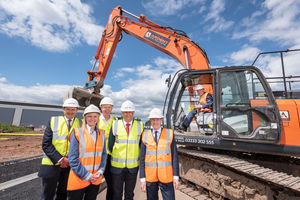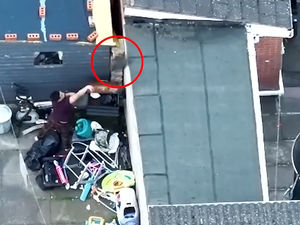Iconic Peaky Blinders factory site to be transformed
A key site in the historic 1926 General Strike which featured in hit BBC drama Peaky Blinders is set to be redeveloped into an industrial park, it has been announced.

The site off Formans Road in Tyseley, once home to the famous Joseph Lucas car battery plant, is now being transformed into a new industrial park as part of a £40m regeneration.
Generations of Birmingham people have worked at the site.
The factory was made famous in 1926 due to its role in the General Strike, which saw nearly two million workers from across the country down tools.
Leading a large section of male workers out of the workforce was Birmingham-born Jessie Eden, a shop steward for the Transport and General Workers Union who worked at the factory filing shock absorbers.
In January 1931 she also led 10,000 women out on a week’s strike, a move which eventually led to a mass movement towards unionisation amongst women.
Jessie’s story was later dramatized in hit BBC TV show Peaky Blinders, where she was played by Irish actress Charlie Murphy.
And, speaking to the Birmingham Post on the 50th anniversary of the strike, Jessie recalled the events which saw her name go down in history.
“One policeman put his hands on my arm. They were telling me to go home, but the crowd howled, ‘Hey, leave her alone’ and then some men came and pushed the policemen away,” she said.
“They didn’t do anything after that. I think they could see that there would have been a riot.
“I was never frightened of the police or the troops because I had the people with me, you see. I don’t know what I’d have felt like on my own.
“As the strike went on, more and more people were joining in. We used to take our turns picketing or join the big meetings in the old Bull Ring. Sacrifices had to be made.
“We had practically no meat during the strike. We lived on bread, jam and marge and my mother would try to make us a milk pudding if she could.”
The old factory was torn down in 2006, and is now set to be transformed into a site which could provide up to 350 jobs.
Eight new industrial units will be the first structures to be built, with support from Birmingham City Council, the Greater Birmingham and Solihull Local Enterprise Partnership (GBSLEP) and remediation funding from the West Midlands Combined Authority (WMCA).
And the units are just the first phase of a larger 19-acre, £40m regeneration project for the site which has stood empty since the factory closed in 2006.
Speaking at the site on Friday (June 21), mayor Andy Street said: “Generations of Brummies worked at the Lucas battery plant and its closure would have been seen by many as another example of the city’s industrial decline.
“Yet the regeneration now taking place on this site is a reflection of the wider economic renaissance we are experiencing in the West Midlands.
“This has seen us re-establish ourselves at the leading edge of automotive manufacture, not least in the development of next-generation battery technology for electric vehicles.”





